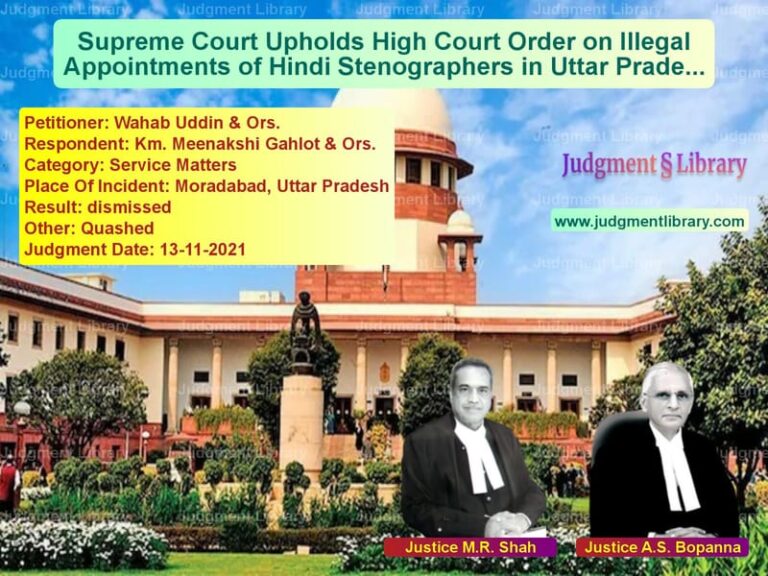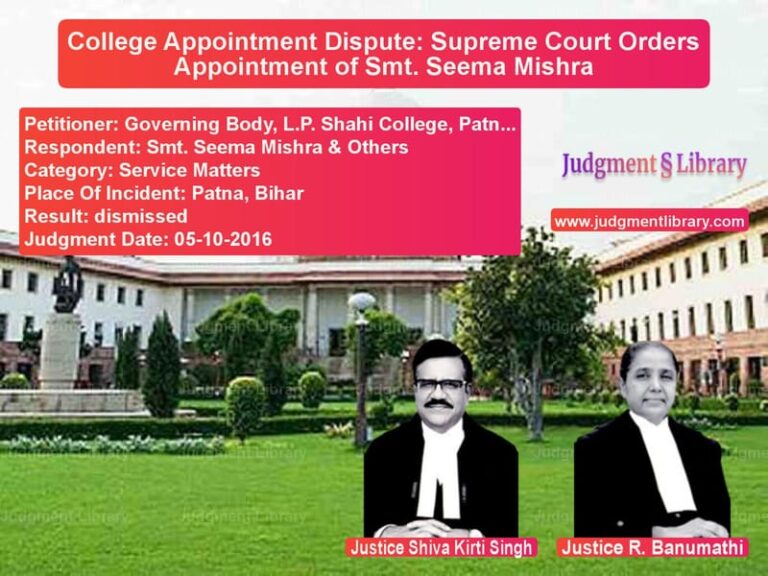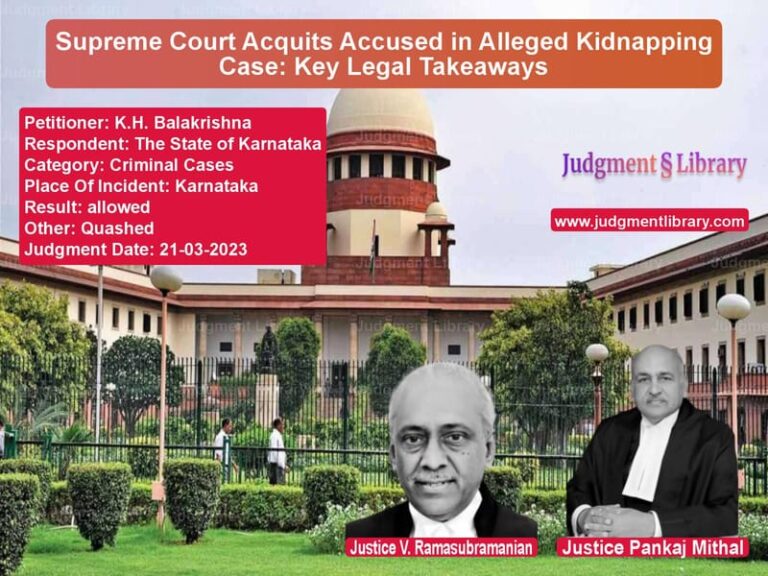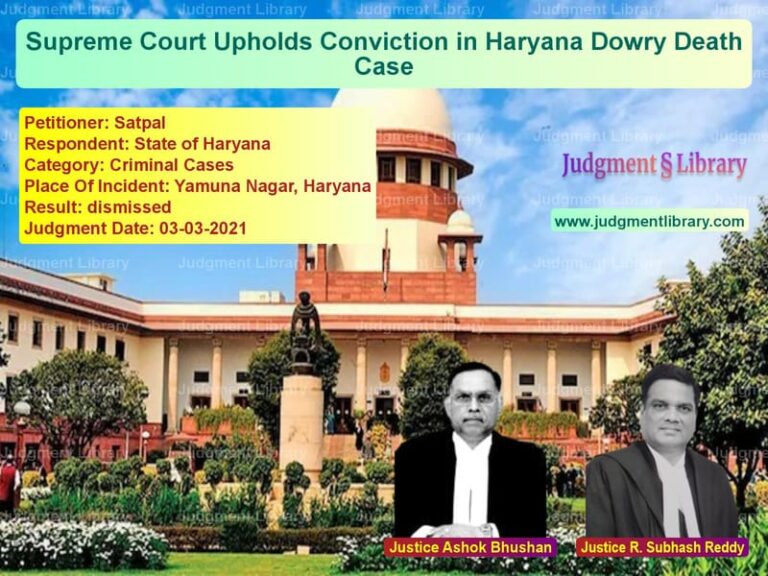Counter-Claim Filing Under CPC: Supreme Court Clarifies Legal Position
The case of Ashok Kumar Kalra vs. Wing Cdr. Surendra Agnihotri & Ors. revolved around the interpretation of Order VIII Rule 6A of the Civil Procedure Code (CPC), which governs the filing of counter-claims in civil suits. The Supreme Court was called upon to determine whether a counter-claim must be filed strictly along with the written statement or if it could be introduced at a later stage, subject to judicial discretion.
The judgment is significant because it balances procedural efficiency with substantive justice. The Court addressed whether procedural rules should be rigidly applied or interpreted flexibly to allow litigants a fair opportunity to present their claims.
Background of the Case
The dispute arose from a property transaction where the plaintiff, Wing Cdr. Surendra Agnihotri, filed a suit for specific performance against the defendant, Ashok Kumar Kalra, based on agreements to sell dated November 20, 1987, and October 4, 1989. The suit was filed on May 2, 2008.
The defendant filed his written statement on December 2, 2008, and subsequently sought to file a counter-claim on March 15, 2009. The trial court allowed the counter-claim despite objections from the plaintiff. However, the High Court quashed the counter-claim on the ground that it was filed after the written statement and, therefore, was not maintainable.
The defendant appealed to the Supreme Court, leading to a reference to a three-judge bench to clarify whether Order VIII Rule 6A creates a strict limitation on the timing of filing counter-claims.
Petitioner’s Arguments (Ashok Kumar Kalra)
The petitioner contended:
- Order VIII Rule 6A is an enabling provision meant to prevent multiplicity of proceedings, allowing counter-claims to be filed even after the written statement.
- No absolute statutory bar exists against filing a counter-claim at a later stage, provided it arises from the same transaction.
- The trial court has discretion to permit counter-claims in the interest of justice.
- Rules of procedure should be interpreted flexibly to ensure that substantive justice is not denied.
Respondent’s Arguments (Wing Cdr. Surendra Agnihotri)
The respondent countered:
- Order VIII Rule 6A mandates that counter-claims must be filed along with the written statement.
- Allowing counter-claims at later stages would delay proceedings and prejudice the plaintiff.
- The legislative intent behind Rule 6A is to ensure procedural discipline and prevent endless amendments.
- Once issues have been framed, no counter-claim should be entertained as it disrupts the trial process.
Supreme Court’s Judgment
The Supreme Court ruled in favor of the petitioner, holding that Order VIII Rule 6A does not impose an absolute bar on filing counter-claims after the written statement. However, it also set clear limitations on when counter-claims could be filed:
- Counter-claims must relate to the same transaction as the original suit.
- They should be filed before the framing of issues to avoid disrupting the trial.
- The trial court has discretion to allow counter-claims, provided it does not prejudice the plaintiff.
- Beyond the framing of issues, counter-claims should not be allowed as they would lead to unnecessary delays.
The Court stated:
“Procedural law is meant to advance justice, not to hinder it. The purpose of allowing counter-claims is to avoid multiple proceedings and ensure efficiency. However, counter-claims must be filed at an appropriate stage to prevent undue delay.”
Key Takeaways
- Counter-claims are not strictly limited to being filed with the written statement.
- The trial court has discretion to allow counter-claims after the written statement, but they must be filed before issues are framed.
- Procedural flexibility must be balanced with judicial efficiency and fairness to both parties.
- Once a trial has progressed significantly, allowing counter-claims could cause delays and prejudice the plaintiff.
- This ruling provides clarity on how courts should handle belated counter-claims and maintains a balance between procedural discipline and substantive justice.
This judgment sets an important precedent on procedural fairness in civil litigation, ensuring that technicalities do not override substantive rights.
Petitioner Name: Ashok Kumar Kalra.Respondent Name: Wing Cdr. Surendra Agnihotri & Ors..Judgment By: Justice N.V. Ramana, Justice Mohan M. Shantanagoudar, Justice Ajay Rastogi.Place Of Incident: India.Judgment Date: 19-11-2019.
Don’t miss out on the full details! Download the complete judgment in PDF format below and gain valuable insights instantly!
Download Judgment: Ashok Kumar Kalra vs Wing Cdr. Surendra A Supreme Court of India Judgment Dated 19-11-2019.pdf
Direct Downlaod Judgment: Direct downlaod this Judgment
See all petitions in Contract Disputes
See all petitions in Specific Performance
See all petitions in Damages and Compensation
See all petitions in Judgment by N.V. Ramana
See all petitions in Judgment by Mohan M. Shantanagoudar
See all petitions in Judgment by Ajay Rastogi
See all petitions in allowed
See all petitions in Modified
See all petitions in supreme court of India judgments November 2019
See all petitions in 2019 judgments
See all posts in Civil Cases Category
See all allowed petitions in Civil Cases Category
See all Dismissed petitions in Civil Cases Category
See all partially allowed petitions in Civil Cases Category







